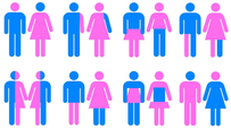Labels: More Important Than You Think
Ellen Jones

Wouldn’t it be nice if we did away with labels for our gender and sexuality? Isn’t the modern world confusing enough already without these new-fangled, seemingly obscure terms describing gender and attraction? Isn’t it all entirely befuddling?
These are questions I am genuinely asked on a regular basis. Whilst I don’t deny labels are a source of much contention, they cannot be considered obsolete, or outdated, not at least until we live in a world where assumptions about gender and sexuality are not made. Also, any argument in favour of their removal doesn’t acknowledge the hindrance that this would be to LGBT+ individuals and, I would argue, the increase of oppression this would cause.
Humans have, throughout history, demonstrated the need to compartmentalise, breaking ourselves down into tiny boxes, which we focus upon. These boxes become our labels. No one really knows for certain, but this incessant need to label appears to be born out of a subconscious desire to form hierarchies and social pecking orders. This is certainly not an issue specific to the LGBT+ community, but it is often we who are attacked for identifying with these labels.
I have heard it remarked how LGBT+ draw attention to our identities by labelling ourselves, because we subsequently present ourselves as something ‘other’, to which my response is that we, as LGBT+ people, would not have to explicitly identify our sexuality and gender if the world didn’t continually assume we are all cisgender or heterosexual. Also, our choice to label ourselves as LGBT+ helps us to find like-minded individuals. I would propose that even if we were identified as ‘other’, if a sense of community can be reached, the use of labels is perfectly justifiable.
Labels are useful, otherwise they would not exist. Having short words which describe a shared experience is extremely practical and helps to facilitate discussion; to remove these labels would be a step towards preventing effective discussion by ensuring people did not have the vocabulary to voice their opinions and experiences. Anyone who disagrees labels are important has clearly never been faced with the intense feelings of frustration that comes from not knowing how to explain who you are, or that your feelings are invalid because you don’t have the vocabulary to explain the things whizzing around in your brain.
Obviously, you do not have to identify your gender or sexuality with a label if you do not want to and there is no rule to state that the label you identify with won’t ever change. But to suggest that these labels are obsolete harms those who do identify with a label and, by proxy, suggests that their identity is just as removable as their label. Yes, we should be working towards a world where labels aren’t necessary, but until that point, we should not attack people for using them, especially if we ourselves make assumptions about gender and sexuality.
These are questions I am genuinely asked on a regular basis. Whilst I don’t deny labels are a source of much contention, they cannot be considered obsolete, or outdated, not at least until we live in a world where assumptions about gender and sexuality are not made. Also, any argument in favour of their removal doesn’t acknowledge the hindrance that this would be to LGBT+ individuals and, I would argue, the increase of oppression this would cause.
Humans have, throughout history, demonstrated the need to compartmentalise, breaking ourselves down into tiny boxes, which we focus upon. These boxes become our labels. No one really knows for certain, but this incessant need to label appears to be born out of a subconscious desire to form hierarchies and social pecking orders. This is certainly not an issue specific to the LGBT+ community, but it is often we who are attacked for identifying with these labels.
I have heard it remarked how LGBT+ draw attention to our identities by labelling ourselves, because we subsequently present ourselves as something ‘other’, to which my response is that we, as LGBT+ people, would not have to explicitly identify our sexuality and gender if the world didn’t continually assume we are all cisgender or heterosexual. Also, our choice to label ourselves as LGBT+ helps us to find like-minded individuals. I would propose that even if we were identified as ‘other’, if a sense of community can be reached, the use of labels is perfectly justifiable.
Labels are useful, otherwise they would not exist. Having short words which describe a shared experience is extremely practical and helps to facilitate discussion; to remove these labels would be a step towards preventing effective discussion by ensuring people did not have the vocabulary to voice their opinions and experiences. Anyone who disagrees labels are important has clearly never been faced with the intense feelings of frustration that comes from not knowing how to explain who you are, or that your feelings are invalid because you don’t have the vocabulary to explain the things whizzing around in your brain.
Obviously, you do not have to identify your gender or sexuality with a label if you do not want to and there is no rule to state that the label you identify with won’t ever change. But to suggest that these labels are obsolete harms those who do identify with a label and, by proxy, suggests that their identity is just as removable as their label. Yes, we should be working towards a world where labels aren’t necessary, but until that point, we should not attack people for using them, especially if we ourselves make assumptions about gender and sexuality.